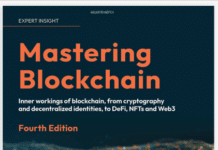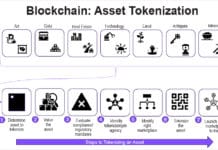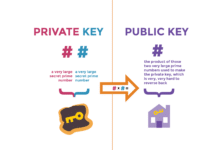If you are a researcher, you may be overwhelmed by the millions of AI tools being launched every day. Do you know that there are diverse and very popular ChatGPT-based tools that are contributing to research in various domains? Let’s get familiar with some of them.
OpenAI launched ChatGPT in late November 2022, based on the generative pre-trained transformer (GPT) architecture. This AI chatbot tool excels in understanding natural language, allowing researchers to interact with it conversationally. This capability makes it easier for researchers to communicate their ideas, ask questions, and receive nuanced responses from the AI tool. Furthermore, ChatGPT can also generate coherent and contextually relevant text, making it useful for summarising, paraphrasing, and creative writing tasks. Researchers can leverage this feature to quickly create summaries of research papers, rephrase complex concepts, or generate content for publications. Figure 1 shows the application of ChatGPT, right from research conception to publishing.
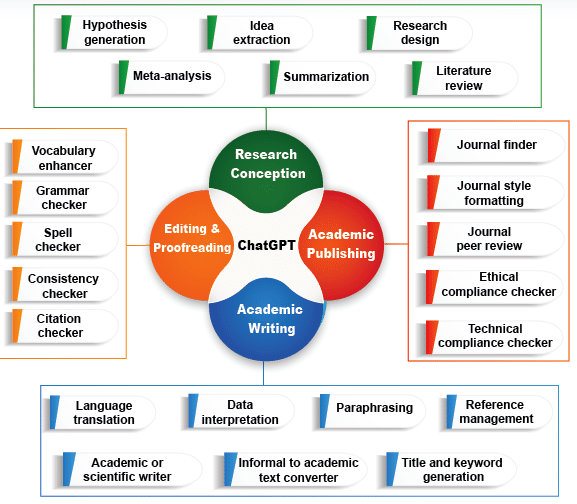
Furthermore, ChatGPT’s advanced natural language processing capabilities, text generation abilities, and versatility make it a valuable asset for researchers seeking to enhance their productivity and explore new avenues in their research. Figure 2 depicts the potential benefits of using ChatGPT for research.
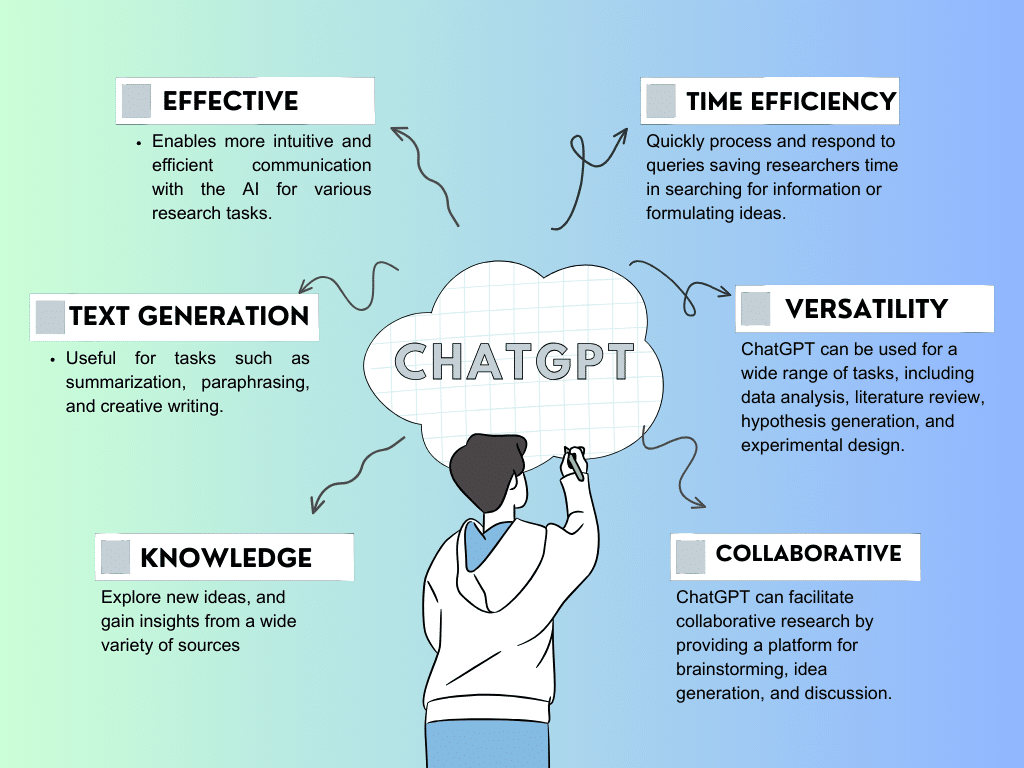
Popular GPT tools for effective literature search
In the ever-expanding landscape of academic research, the need for efficient and effective literature search tools has become paramount. These tools streamline the finding of relevant scholarly articles and papers, and aid in synthesising and analysing the vast amount of information available. In Table 1, we present a curated list of popular GPT tools that represent the forefront of innovation in the literature search for academic research. These tools provide researchers with powerful capabilities to enhance their productivity and the quality of their work.
Table 1: GPT tools to carry out effective literature search
| Name | Features | Function | URL |
| ResearchGPT | Research-oriented language model | An AI-powered assistant that can search millions of academic papers to provide science-based answers | https://www.researchgpt.com/ |
| Academic Research Reviewer | Reviewing and evaluating academic research | Offers a comprehensive review of research papers providing suggestions for improvement | https://chat.openai.com/g/g-YgkKaPZNm-academic-research-reviewer |
| Literature Review GPT | Specialised in generating literature reviews | Provides a user-friendly guide for conducting academic literature reviews on specific research topics | https://chat.openai.com/g/g-VtGdv9Ulz-literature-review-gpt |
| ChatPaper | Focuses on conversational writing | Specialised in summarising academic papers, particularly in the medical and scientific research fields | https://chatpaper.com/ |
| ScholarAI | Academic writing and research assistance | Assists in navigating a corpus of over a million articles, journals, and books, acting as a research assistant | https://scholarai.com/ |
| Quick Writing Academic’s Papers | Rapid academic paper drafting | Aids users in progressively deepening answers when writing academic papers | https://quickwritingacademicspapers.com/ |
| Academic Analyzer | Analysing academic papers and data | Analyses academic articles by summarising research topics, methods, and conclusions | https://chat.openai.com/ |
| Academic Paper Specialist | Specialised in academic paper writing | Assists in academic writing and editing. | https://chat.openai.com/g/g-jryw3pfsH-academic-paper-specialist |
| Auto Expert
(Academic) |
Expertise in academic writing and research | An expert in scholarly paper analysis and educational research assistance | https://chat.openai.com/g/g-YAgNxPJEq-autoexpert-academic |
| AI Paper Polisher Pro | Advanced AI for refining academic papers | A professional assistant for polishing AI academic papers | https://chat.openai.com/g/g-VX52iRD3r-ai-paper-polisher-pro |
GPT tools for research data analysis
In research data analysis, the availability of advanced tools leveraging artificial intelligence (AI) and natural language processing (NLP) has revolutionised the way researchers explore and interpret data. These tools offer sophisticated data analysis, statistical testing, and research paper analysis capabilities. Table 2 gives a list of popular GPT tools tailored for research data analysis.
Table 2: List of GPT tools for research data analysis
| Name | Function | Use cases | URL |
| Data Analysis GPT | Data analysis, insights generation | Data analysis in various domains | https://dataanalysisgpt.com/ |
| Statistics Test GPT | Statistics learning, test preparation | Learning and practising statistics | https://chat.openai.com/g/g-QAw7hzrHs-statistics-test-gpt |
| Research-Paper
Analyzer |
Research paper analysis, data insights | Academic research and analysis | https://chat.openai.com/g/g-dVhODA8DW-research-paper-analyzer |
| AI Data Analysis | Automated data analysis, insights generation | Data analysis in business and research | https://aidataanalysis.com/ |
| Excel Analyst GPT | Automated Excel analysis, reporting | Data analysis and reporting in Excel | https://excelanalystgpt.com/ |
| Stats Guide for Data Science | Statistics learning, concepts explanation | Learning statistics for data science | https://statsguidefordatascience.com/ |
| GPTChart | Automated chart creation, visualisation | Data visualisation and charting | https://gptchart.com/ |
| Data Detective | Data analysis, insights generation | Detecting patterns and anomalies | https://datadetective.com/ |
Key AI-based literature mapping tools
The process of literature mapping plays a crucial role in identifying, organising, and analysing existing literature relevant to a particular topic or research question. AI-based literature mapping tools have emerged as powerful aids for researchers in navigating the vast landscape of scholarly publications. Table 3 presents a selection of crucial AI-based literature mapping tools.
Table 3: Comparison of AI-based literature mapping tools
| Tools | Developed by | Literature searching | Integration with referencing software | Cost |
| Research Rabbit | Research Rabbit Ltd | By similarity and citation count | Sync with Zotero and import/export RIS and BibTex files | Free |
| Inciteful | OpenAI | By similarity and citation count | Import/export files from BibTex/Zotero | Free |
| Litmaps | Kyle Webster and Axton Pitt | By similarity, citation count, and AI semantic search | Sync with Zotero and import/export RIS and BibTex files | Premium |
| Connected
Papers |
Connected Papers | By similarity and citation count | Export files in BibTex | Premium |
Tool alternatives to ChatGPT
The popularity of ChatGPT alternatives is driven by their ability to address specific needs, offer diverse features, and keep pace with advancements in AI and natural language processing technologies.
ChatGPT alternatives, such as Perplexity, Scite, Elicit, Consensus, Microsoft Bing, Poe, and ChatSonic, have emerged as valuable tools in the research landscape. These alternatives offer a range of applications tailored to the specific needs of researchers, including language model evaluation, academic paper analysis, text extraction and summarisation, consensus analysis, web search and information retrieval, creative writing generation, and conversational AI for research assistance. Figure 3 shows the tools that are alternatives to ChatGPT.
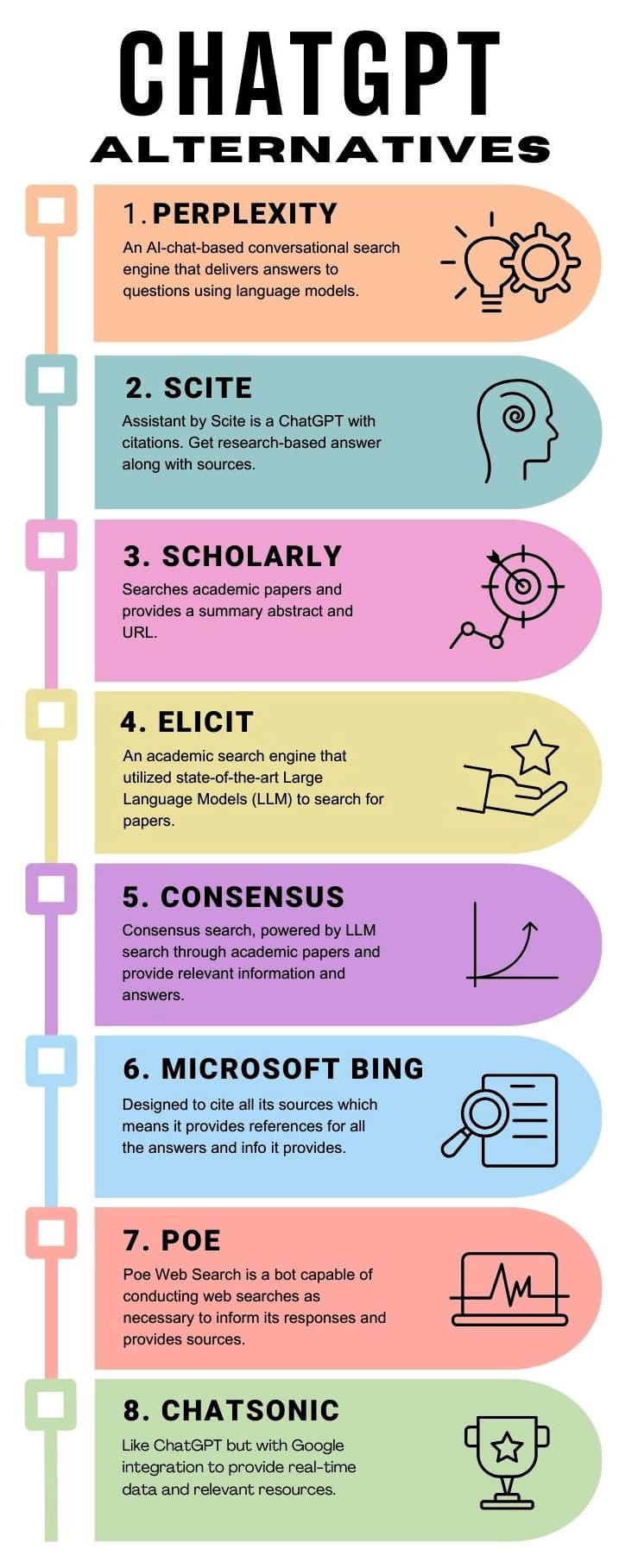
To sum up, ChatGPT-based tools are valuable assets for researchers seeking to optimise their research workflows and achieve greater efficiency and impact in their academic endeavours. By automating tasks such as literature review, statistical analysis, and paper writing assistance, these tools enable researchers to focus more on their work’s creative and analytical aspects.





